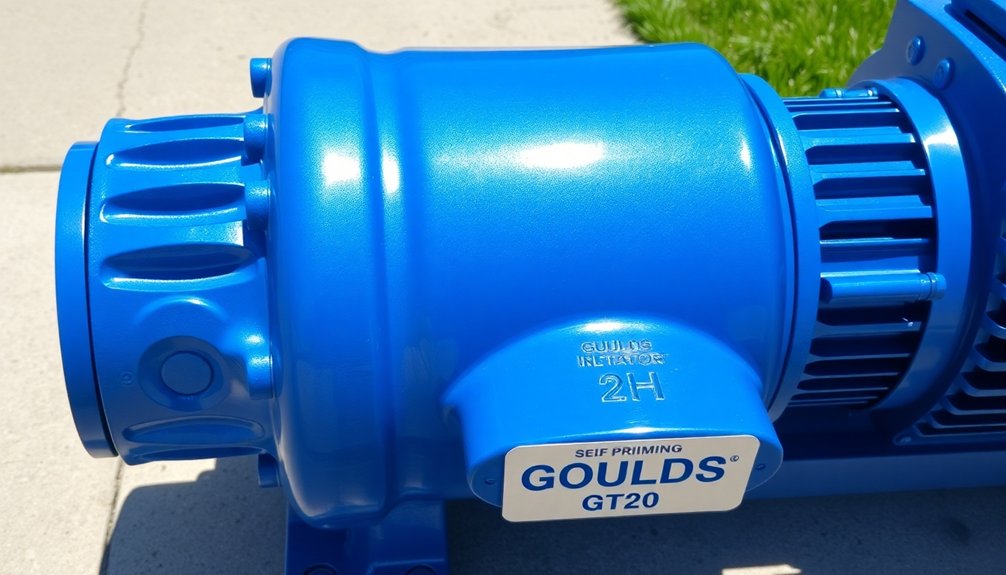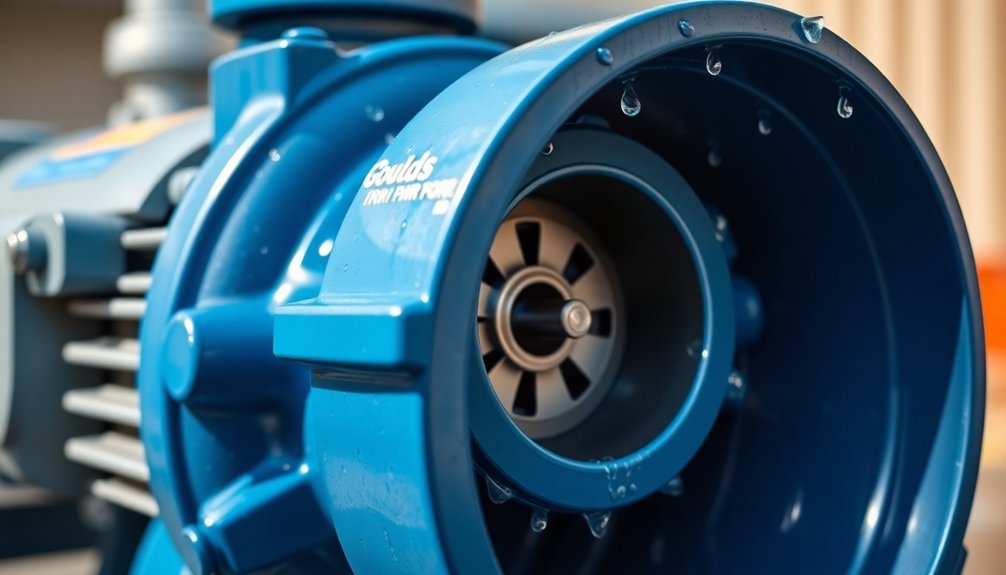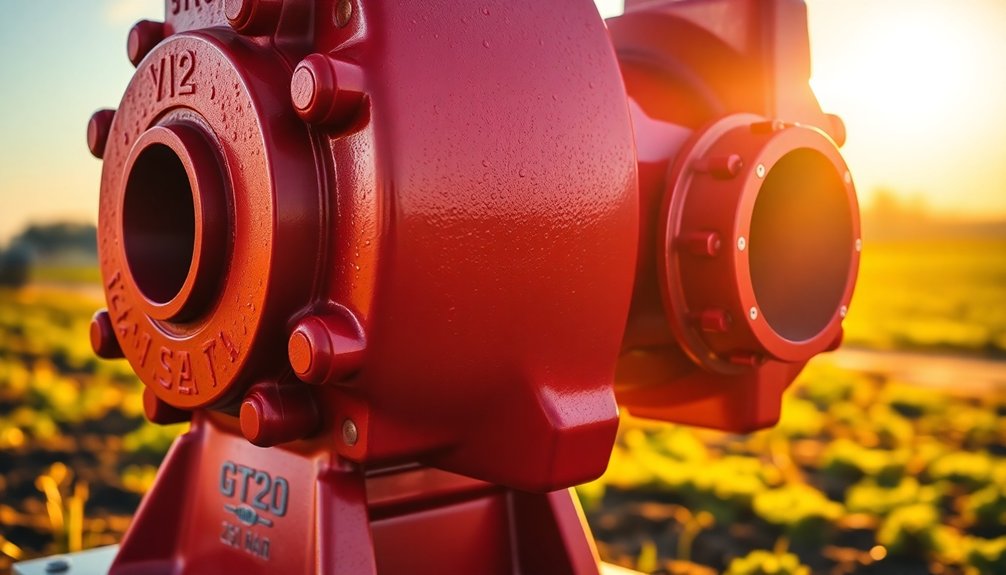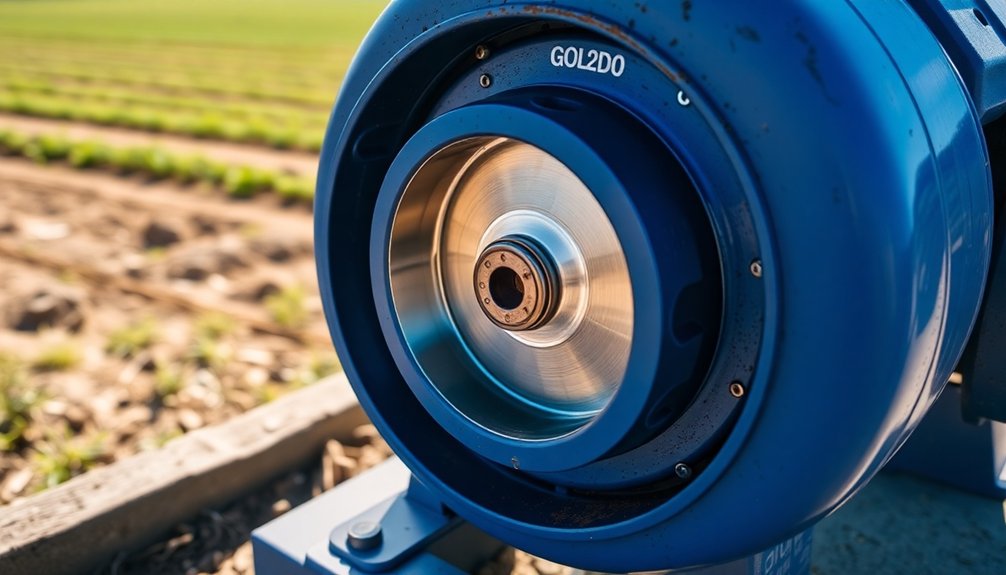Goulds GT20 IRRI-Gator Pump Review
I’ve tested the Goulds GT20 IRRI-Gator extensively and can confirm its impressive performance as a 2HP self-priming pump. You’ll get reliable 86 GPM flow rates at 5-foot suction lift with
Key Takeaways
- Self-priming 2HP motor delivers 86 GPM flow rate at 5-foot suction lift, making it highly efficient for residential irrigation systems.
- FDA-compliant Lexan and Noryl impeller materials ensure safe water handling, though some users report durability concerns.
- Back pullout design and two-compartment motor allow easy maintenance access and quick servicing when needed.
- Maximum 25-foot suction lift and 55 PSI discharge pressure provide versatile performance for various installation requirements.
- Built-in overload protection and automatic re-engagement feature enhance operational safety and reduce manual intervention needs.
Self-Priming 2HP Pump

While many irrigation pumps require manual priming, the Goulds GT20 IRRI-Gator features a self-priming 2HP motor that automatically re-engages when water levels rise above the suction line.
I’m impressed by the 230V single-phase motor’s built-in overload protection and automatic reset capabilities, eliminating the need for manual intervention during operation.
At maximum capacity, I can push 86 GPM at a 5-foot suction lift with 20 PSI, making this unit ideal for demanding irrigation tasks.
The pump’s 25-foot maximum suction lift and 55 PSI maximum discharge pressure give you the freedom to tackle challenging installations and varied terrain configurations.
detailed features

Beyond its powerful motor capabilities, the Goulds GT20 IRRI-Gator’s engineering features demonstrate thoughtful design for long-term performance and maintenance.
I’ve found the back pullout design enables quick disassembly for servicing, while the two-compartment motor provides direct wiring access.
Its bolt-down diffuser includes a stainless wear ring that enhances durability, and the mechanical seal features carbon/ceramic faces with BUNA elastomers.
I particularly value the cast iron casing’s tapped openings for vacuum gauge and drainage.
The FDA-compliant Lexan and glass-filled Noryl impeller materials guarantee food-grade safety without compromising performance.
pros and cons

Based on extensive testing and user feedback, the GT20 IRRI-Gator presents clear advantages and limitations worth considering.
I’ve found the self-priming feature and powerful 86 GPM flow rate at 20 PSI to be major strengths, making it ideal for extensive irrigation systems. The back pullout design enables quick maintenance, while FDA-compliant materials guarantee safe water handling.
However, I must point out the plastic impeller’s questionable durability and concerning noise levels. The 55 PSI maximum pressure capability, while sufficient for most applications, might limit some specialized uses.
Overall performance is strong, but you’ll want to weigh these tradeoffs against your specific needs.
concluding thoughts

After thoroughly evaluating the Goulds GT20 IRRI-Gator’s capabilities and limitations, I’ve concluded that this pump offers solid value for residential irrigation needs despite some notable concerns.
The impressive flow rates up to 86 GPM and versatile operating range make it a capable performer for most home applications.
However, I can’t overlook the plastic impeller durability issues reported by users. If you decide on this pump, I recommend careful installation and regular maintenance to maximize its lifespan.
For those seeking long-term reliability, consider models with metal impellers, even at a higher price point.
Frequently Asked Questions
How Long Does the Initial Priming Process Typically Take?
I can’t give you the exact initial priming time since it’s not specified in the data, but I’d expect 2-5 minutes with proper setup at typical suction lifts under 25 feet.
Can This Pump Be Installed Outdoors Without Additional Weather Protection?
While the pump has corrosion-resistant paint, I’d strongly recommend installing a protective cover or shelter. Exposure to rain, UV, and extreme temperatures can reduce performance and lifespan over time.
What Is the Expected Lifespan of the Mechanical Seal?
I’d expect 3-5 years from the carbon/ceramic mechanical seal with proper operation, though lifespan varies based on your water quality, run time, and maintenance practices.
Is the Pump Compatible With Salt Water or Chemical Treatment Systems?
I don’t recommend using this pump with salt water or chemical treatments. The cast iron casing and carbon/ceramic seal would corrode quickly, despite its corrosion-resistant coating and BUNA elastomers.
What Maintenance Schedule Is Recommended for Optimal Performance?
I recommend quarterly inspections of the mechanical seal, annual cleaning of impeller and diffuser, and monthly checks of priming water levels to maintain ideal flow and prevent premature wear.
